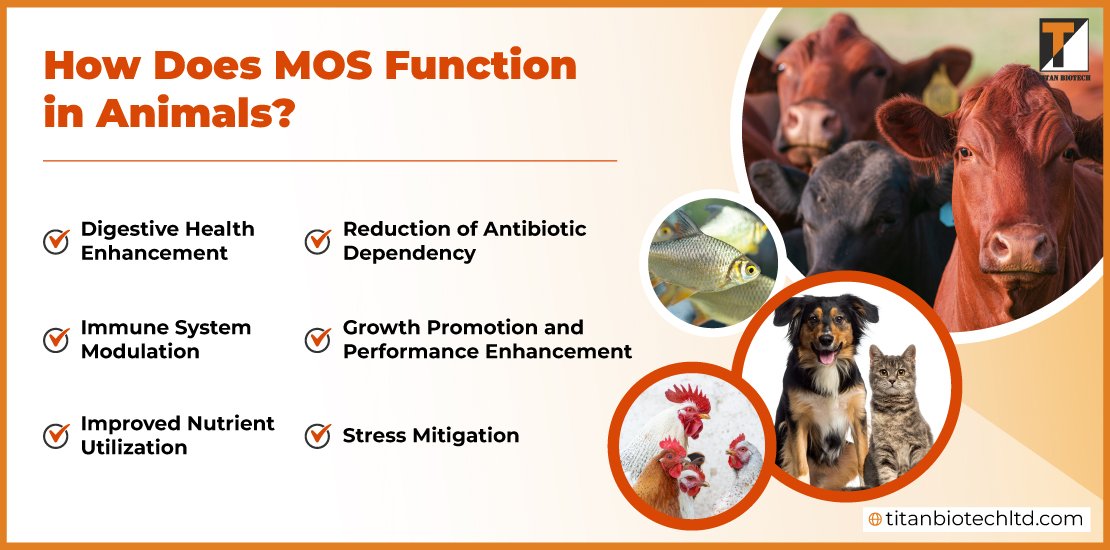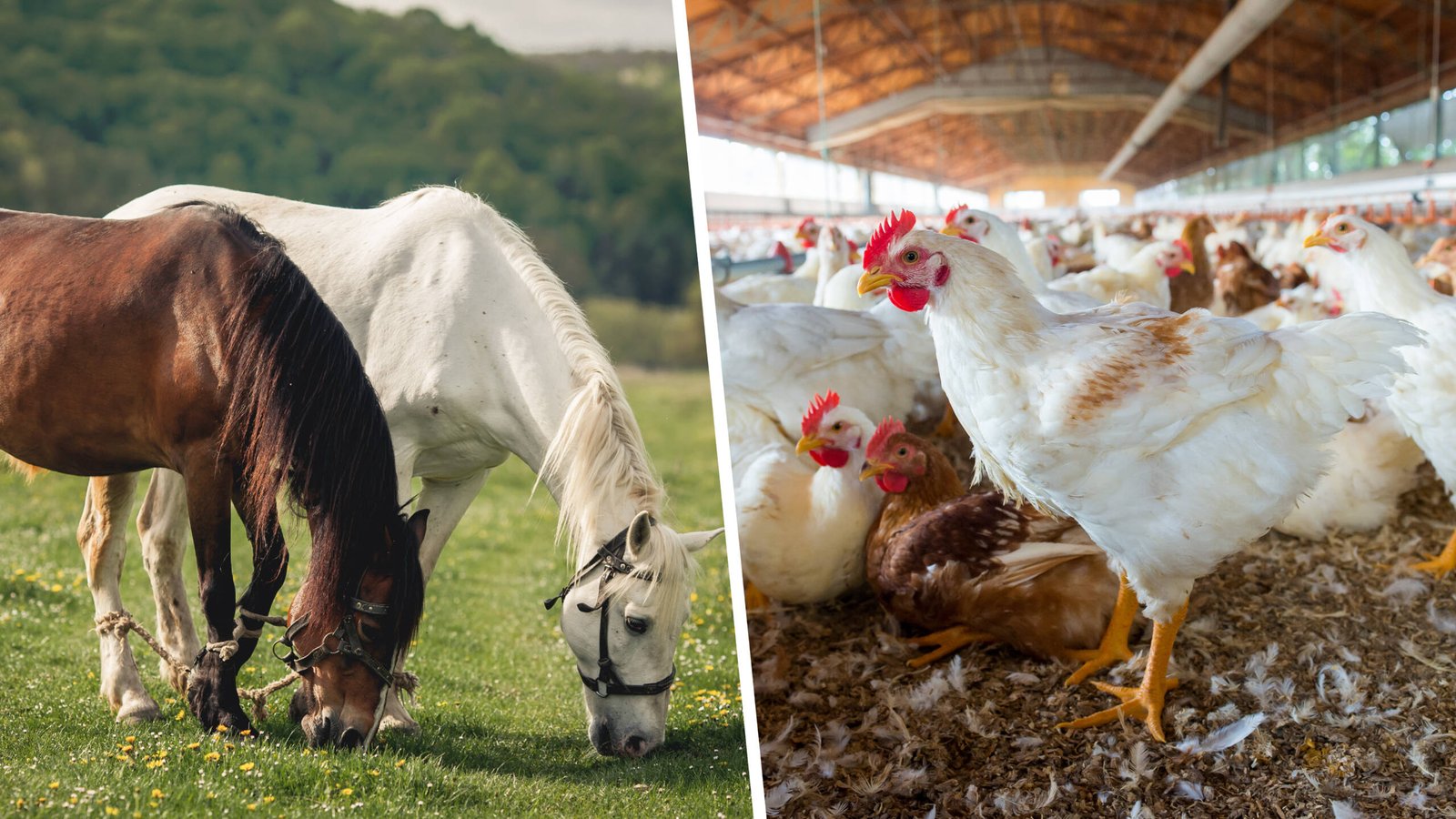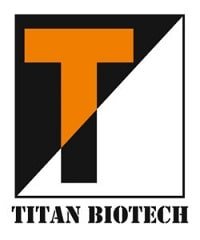Table of Content
- How Does MOS Function in Animals?
- Critical Applications of MOS in Animal Nutrition
- How Do You Incorporate Mannan Oligosaccharides Into Animal Nutrition?
- About Titan Biotech Limited
- Conclusion
- Frequently Asked Questions
- References
Mannan Oligosaccharides (MOS) are emerging as a fascinating and indispensable feed ingredient. They are derived from the cell walls of yeast, particularly Saccharomyces cerevisiae. MOS are complex carbohydrates consisting of short mannose chains. Their unique biological properties make them a valuable inclusion in animal diets, offering a range of benefits that extend from digestive health to immune system support.
MOS in animal feed are characterized by their molecular structure consisting of several sugar molecules. The mannose-rich composition of MOS distinguishes them, creating a compound with distinct prebiotic properties. The specific arrangement of these mannose chains contributes to their ability to interact with the gut microbiota, setting the stage for numerous physiological benefits.
How Does MOS Function in Animals?

Mannan Oligosaccharides (MOS) play a pivotal role in animal nutrition by acting as prebiotics that positively influence gut health. MOS binds to harmful pathogens, preventing their adhesion to the intestinal lining and reducing infection risks. The immunomodulatory properties support a robust immune response, while anti-inflammatory effects contribute to gastrointestinal health.
MOS also aids in stress reduction, enhances palatability in pet food, and may assist in managing allergies. MOS is a multifaceted nutritional supplement promoting animal digestive well-being and overall health. Let’s see the detailed functioning of MOS in animals.
1) Digestive Health Enhancement
- Prebiotic Action: MOS act as prebiotics, selectively promoting the growth of beneficial bacteria (such as Lactobacillus and Bifidobacterium) in the gastrointestinal tract. It enhances the overall microbial balance, improving digestion and nutrient absorption.
- Competitive Exclusion: MOS can competitively exclude pathogenic bacteria by binding to their receptors, preventing them from attaching to the intestinal lining. This mechanism helps reduce the risk of gastrointestinal infections and enhances gut integrity.
2) Immune System Modulation
- Stimulation of Immune Response: MOS has been shown to stimulate antibody production and enhance immune cell activity. By promoting the synthesis of cytokines, MOS contributes to a more robust immune response, making animals more resistant to infections and diseases.
3) Improved Nutrient Utilization
- Enhanced Digestibility: Mannan Oligosaccharides in animal feed have been linked to improved digestibility of nutrients, including proteins, carbohydrates, and fats. This results in more efficient nutrient utilization and better feed conversion ratios, ultimately improving growth rates and performance.
4) Growth Promotion and Performance Enhancement
- Weight Gain: MOS supplementation is associated with increased weight gain in various animal species, including poultry, pets, swine, and cattle. Promoting a healthy gut environment and improved nutrient absorption enhances growth performance.
- Feed Efficiency: Animals fed with MOS-containing diets often exhibit better feed efficiency, meaning they convert feed into body mass more effectively. It is precious for optimizing resource utilization in livestock production.
5) Reduction of Antibiotic Dependency
- Alternative to Antibiotics: MOS offers a sustainable alternative to antibiotics by supporting the natural defense mechanisms of animals. The ability to create an environment unfavorable to pathogenic bacteria reduces the reliance on antibiotics in animal production, addressing concerns related to antibiotic resistance.
6) Stress Mitigation
- Adaptation to Stressful Conditions: MOS has been observed to help animals adapt to stressful conditions, such as weaning in piglets or transportation stress. MOS’s gut microbiota and immune system modulation contribute to increased resilience during challenging periods.
Critical Applications of MOS in Animal Nutrition

Mannan Oligosaccharides (MOS), derived from yeast cell walls, have proven versatile and effective in various animal production sectors. The applications of MOS extend to poultry, swine, pets, cattle, and even aquaculture, demonstrating its widespread utility in promoting health, enhancing performance, and contributing to overall well-being.
Poultry
1) Digestive Health Enhancement
- Mannan Oligosaccharides in poultry nutrition serve as a prebiotic, fostering the growth of beneficial bacteria in the gut.
- Competitive exclusion mechanisms prevent the binding of pathogenic bacteria, reducing the risk of intestinal infections and maintaining gut integrity.
2) Performance Improvement
- Improved nutrient digestibility enhances feed conversion ratios, promoting efficient nutrient utilization.
- MOS has been associated with increased egg production and improved quality of eggs in layers.
3) Stress Mitigation
- During periods of stress, such as transportation or changes in diet, MOS aids in minimizing the negative impacts by supporting gut health and the immune system.
Pets
1) Digestive Health
- Mannan Oligosaccharides for dogs can act as prebiotics, promoting the growth and activity of beneficial bacteria in the gastrointestinal tract.
- It enhances the balance of the gut microbiota, improving digestion and nutrient absorption in pets.
2) Immune System Support
- MOS may contribute to pets’ overall health by supporting the immune system.
- It helps develop a robust immune response, potentially reducing the risk of infections.
3) Pathogen Binding
- Mannan Oligosaccharides, as a toxin binder, bind to harmful pathogens such as bacteria and toxins in the digestive tract.
- This binding helps prevent the attachment of pathogens to the intestinal lining, reducing the risk of infections and maintaining gut health.
4) Anti-Inflammatory Effects
- Mannan Oligosaccharides (MOS) may exhibit anti-inflammatory properties, benefiting pets with inflammatory conditions or sensitivities.
- It helps in managing inflammatory responses in the gastrointestinal tract.
5) Improved Nutrient Utilization
- MOS can improve overall health by enhancing nutrient absorption in the digestive system.
- It supports the utilization of essential nutrients from the pet’s diet.
6) Reduced Diarrhea Incidence
- Mannan Oligosaccharides for cats may help reduce the incidence of diarrhea in pets by promoting a healthier gut environment.
- It supports the stability of the intestinal environment, which is crucial for preventing digestive issues.
7) Enhanced Palatability
- MOS can be added to pet food to enhance palatability, making it more appealing to pets.
- Encourages pets to consume their food, ensuring they receive the potential health benefits of MOS supplementation.
8) Support During Antibiotic Treatment
- MOS can be beneficial during and after antibiotic treatments.
- It helps maintain a healthy balance of gut bacteria, minimizing the disruption caused by antibiotics.
Cattle
1) Rumen Health and Microbial Balance
- Mannan Oligosaccharides in cattle support a balanced microbial population in the rumen, improving fermentation processes and nutrient absorption.
- MOS may lead to increased milk production in dairy cows and improved weight gain in beef cattle.
2) Reduced Risk of Digestive Disorders
- MOS supplementation in ruminants has been associated with a reduced risk of digestive disorders in cattle, contributing to overall herd health.
3) Immune System Support
- MOS enhances disease resistance, particularly during stress or exposure to pathogens.
Aquaculture
1) Gut Health in Fish and Shrimp
- Mannan oligosaccharide in fish promotes a healthy gut microbiota, improving digestion and nutrient absorption.
2) Disease Resistance
- The immune-stimulating properties of MOS contribute to enhanced disease resistance in aquatic species, reducing the incidence of infections.
3) Growth Enhancement
- MOS supplementation has improved fish and shrimp farming’s growth rates and feed efficiency.
4) Environmental Impact
- MOS in shrimps helps reduce the need for antibiotics and aligns with sustainable aquaculture practices, minimizing the environmental impact of antimicrobial use.
Swine
1) Post-Weaning Diarrhea Prevention
- MOS effectively prevents post-weaning diarrhea in piglets by promoting a balanced gut microbiota and reducing the colonization of pathogenic bacteria.
2) Growth Promotion
- Enhanced nutrient absorption contributes to improved growth rates and feed efficiency in swine.
- MOS supplementation in animals has been linked to increased weight gain and reduced mortality rates in pig production.
3) Antibiotic Reduction
- MOS in animal feed helps reduce reliance on antibiotics by promoting a healthy gut environment, thereby mitigating concerns related to antibiotic resistance.
How Do You Incorporate Mannan Oligosaccharides Into Animal Nutrition?

Mannan Oligosaccharides (MOS) can be given to animals as a nutritional supplement, typically included in their diet. Here are several standard methods for administering MOS to animals:
- Incorporate into Commercial Pet Food- Many pet food manufacturers include MOS in their formulations.
- Use MOS Supplements- MOS supplements are available in various forms, including powders, liquids, or capsules. These can be added to the animal’s regular food.
- Mix with Wet Food- If your pet prefers wet food, you can mix MOS supplements directly into the moist food.
- Administer with Treats- Some MOS supplements come in treat form. It makes giving the supplement as a reward or treat easy, ensuring that the animal consumes it willingly.
- Blend into Homemade Diets- If you prepare homemade diets for your pets, consult a veterinarian to determine the appropriate dosage and blend MOS supplements into the recipes.
- Consult with a Veterinarian- Before introducing MOS or any other supplement, it’s crucial to consult with a veterinarian. They can guide the appropriate dosage for your specific animal, considering its species, size, health status, and dietary needs.
- Consideration of Pet Preferences- Take into account your pet’s preferences. Some animals may not notice or mind the addition of MOS to their food, while others may be more sensitive to changes in taste or texture.
About Titan Biotech Limited
Titan Biotech Limited is one of the leading manufacturers of Mannan Oligosaccharides. We manufacture other biological products/ingredients used in pharmaceuticals, nutraceuticals, food & beverages, biotechnology & fermentation, cosmetics, and veterinary & animal feed.
With the experience of more than 30+ years and a remarkable market presence in 100+ countries, Titan Biotech consistently pushes the boundaries of research and development to deliver the best quality biological products. We are committed to a total customer satisfaction policy. It is achieved by providing customers with the highest quality products and the most responsive customer support services.
Besides the quality, we always emphasize supplying the most competitive prices to the market to cater to & create a successful situation in the marketplace.
You can contact us if you require Mannan Oligosaccharides in animal feed for poultry, pets, ruminants, swine, and aquaculture. Our representative will provide the customized solution as per your requirements.
Conclusion
Mannan Oligosaccharides are a cornerstone in modern animal nutrition, offering tailored solutions for various livestock sectors. From bolstering digestive health to enhancing growth performance and supporting immune function, MOS’s applications in poultry, swine, cattle, pets, and aquaculture underscore its versatility and efficacy. The role of MOS in optimizing animal health and productivity remains pivotal, contributing to a more sustainable and responsible approach to animal husbandry.
Frequently Asked Questions (FAQs)
What are Mannan Oligosaccharides (MOS), and how are they derived?
Mannan Oligosaccharides (MOS) are complex carbohydrates derived from the cell walls of yeast, particularly Saccharomyces cerevisiae. They consist of short mannose chains and are utilized in animal nutrition for their prebiotic properties and numerous health benefits.
How do Mannan Oligosaccharides function in the digestive system of animals?
MOS function as prebiotics, selectively nourishing beneficial bacteria in the gastrointestinal tract. They competitively exclude pathogenic bacteria, modulate the gut microbiota, stimulate the immune response, and enhance gut barrier function, improving digestive health and overall well-being.
What animal species can benefit from Mannan Oligosaccharides in their diets?
Mannan Oligosaccharides have demonstrated efficacy across various animal species, including poultry, pets, swine, cattle, and aquaculture. Their applications extend to promoting gut health, enhancing growth performance, and reducing the reliance on antibiotics in these sectors.
How do Mannan Oligosaccharides contribute to growth promotion in animals?
MOS improves nutrient digestibility and absorption, leading to better feed conversion ratios and more efficient use of dietary resources. It contributes to enhanced weight gain and overall growth performance in animals.
Can Mannan Oligosaccharides be used as an alternative to antibiotics in animal nutrition?
Yes, MOS can serve as a sustainable alternative to antibiotics. By promoting a healthy gut environment, reducing the risk of infections, and modulating the immune system, Mannan Oligosaccharides contribute to decreased antibiotic dependency in animal production.
Are there any specific considerations or precautions when incorporating Mannan Oligosaccharides into animal diets?
While generally considered safe, it’s essential to follow recommended dosage guidelines. It is recommended to consider the specific needs of the animal species, age groups, and production goals when formulating diets with MOS. Additionally, consulting with a nutritionist or veterinarian is recommended for tailored and optimal usage.
References
- https://www.ncbi.nlm.nih.gov/pmc/articles/PMC8254473/
- https://www.mdpi.com/2076-2615/10/8/1283
- https://www.ncbi.nlm.nih.gov/pmc/articles/PMC10518593/
- https://www.frontiersin.org/articles/10.3389/fmicb.2023.1324277/full
- https://pubmed.ncbi.nlm.nih.gov/34944334/

